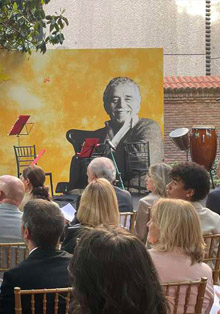Pedro González
Journalist
Although it is called the Colorado Party, Paraguay’s hegemonic political force for the past seven decades is eminently conservative. Almost all polls predicted a very tight electoral contest with the left-wing party grouped under the label of Concertación para un Nuevo Paraguay (Concertation for a New Paraguay). The latter, and its presidential candidate, Efraín Alegre, were supported by practically all the forces that have taken power in Latin America, to the point of staining the continent with the red colour of leftism, from Andrés Manuel López Obrador’s Mexico to Gabriel Boric’s Chile or Lula da Silva’s immense Brazil. Looking at the entire map from the Rio Grande to Tierra del Fuego, the immense red stain of the left barely shows the blue incrustations of the right in Guatemala, El Salvador, Costa Rica, Ecuador, Uruguay and Paraguay.
The fact that the conservatives of Paraguay’s Colorado Party will have another five years in power has, therefore, the initial significance of having put a check on what seemed to be an unstoppable advance of the entire left-wing spectrum, from its most moderate variants to the most extreme of the so-called Bolivarian axis, made up of the dictatorships or tyrannies of Cuba, Venezuela and Nicaragua.
The overwhelming victory of the economist Santiago Peña over the leftist Efraín Alegre (42.7% versus 27.4% of the vote) shows that the Paraguayan electorate has taken good note of the practical reality that the governments that have been set up in the region by the different variants and mixtures of Castroism, Chavism, Peronism and neo-communist populism have led to.
Despite all the country’s major shortcomings, especially a poverty rate of 25 per cent, a deficient public health system with huge deficiencies and, above all, the growing presence of drug trafficking, which is poisoning political and social life and fuelling corruption, Paraguayans have preferred to believe the promises of the Conservative Coloradoan Santiago Peña, especially that he will create half a million jobs in a country of 7.5 million inhabitants. Also, that he will fight to ensure that the tide of “woke” thinking does not sweep away the country’s traditional spiritual and family values.
However, it is worth noting the 22.9% of the votes obtained by the anti-establishment candidate, Paraguayo Cubas. The fact that such a large number of voters cast their ballots for a discourse that abhors parliamentarism and all the country’s civil service is at least a powerful warning sign of the weariness expressed by almost a quarter of the country, which ultimately rejects the entire political class en bloc.
A programme with international repercussions
When he takes office next August from the current president, Mario Abdo Benítez, Santiago Peña will have the backing of the absolute majorities he has won in the Chamber of Deputies and the Senate, as well as the support of fourteen of the country’s seventeen governorships. He will therefore have ample room for manoeuvre to demonstrate the sincerity of his promises and to eventually silence those who have persistently accused him of being an “opportunist” and a “chile”. The former, in reference to his past as a militant of the Liberal Party (centre-left). The second, for having become, according to his detractors, the “servant for everything” of former president Horacio Cartes, the country’s leading businessman and biggest fortune, accused of corruption in the United States, where he is banned from entering.
“From today we will begin to design the Paraguay we all want, without great inequalities or unjust social asymmetries,” Peña said in his first statement after being proclaimed president-elect. He has his work cut out for him, especially with the sinister shadow of the very powerful drug trade looming over the life of the country.
In addition to the consequences for the Ibero-American continent of this election in Paraguay, the permanence of the Colorado Party and Santiago Peña in Asunción will have other consequences beyond the American continent: maintaining the commitment to the alliance between the EU and Mercosur; remaining one of only thirteen countries that maintain diplomatic recognition of Taiwan vis-à-vis China (Honduras was the last to exchange Taipei for Beijing), and keeping the promise to Israel to move its embassy from Tel Aviv to Jerusalem.
© Atalayar / All rights reserved






